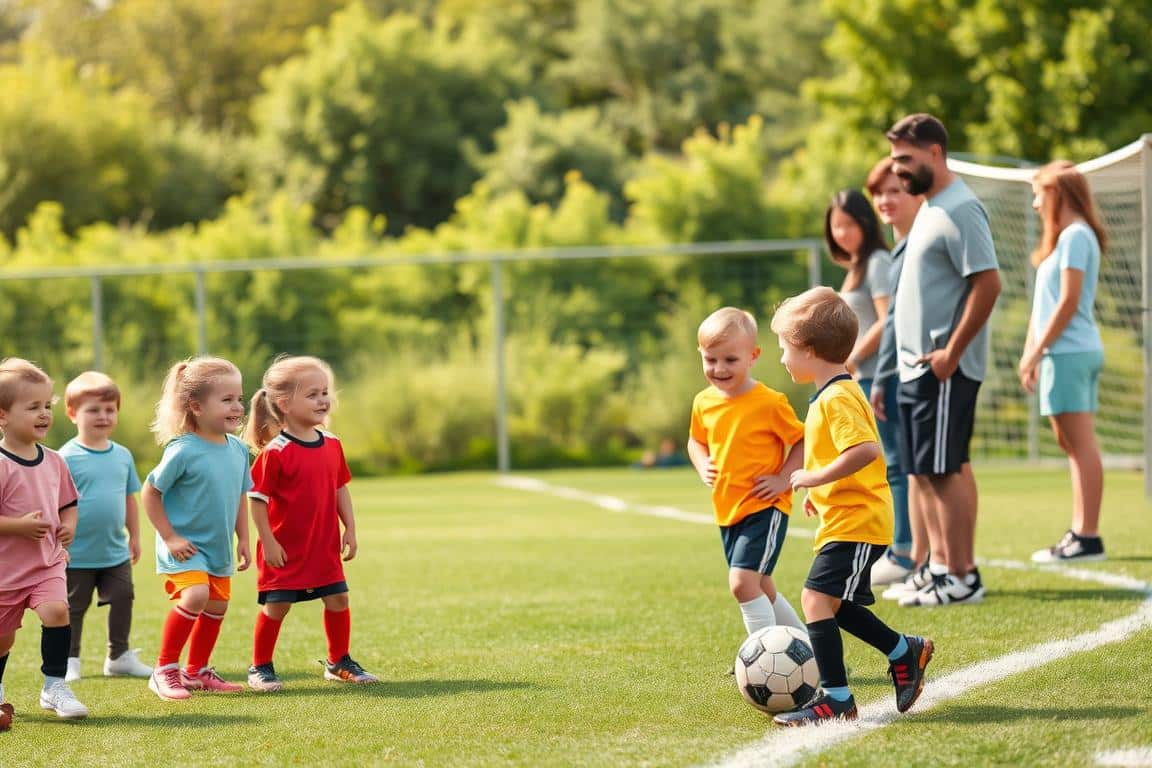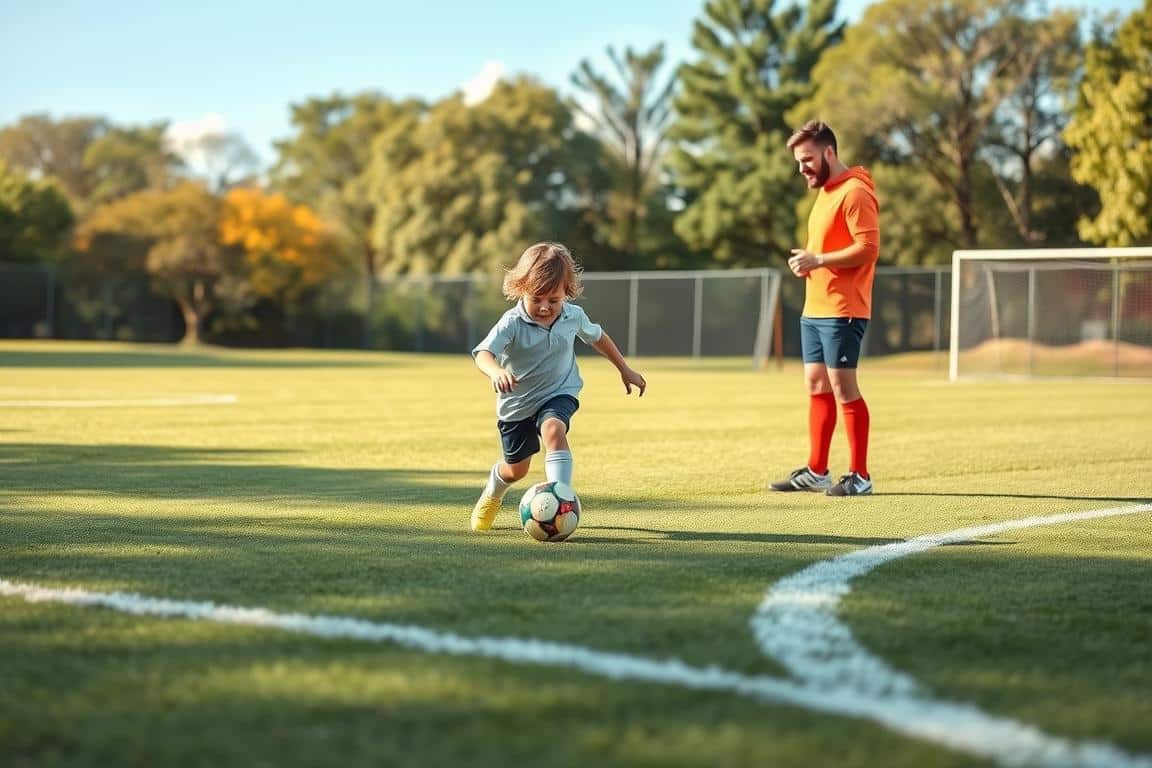Guide to Positive Soccer Sideline Behavior for Parents

Soccer sideline behavior for parents sets the tone at every youth match and can change how children feel about the game. I know a calm, warm cheer can lift a child’s confidence, while harsh words make them tense and less eager to play.
I speak from experience: when I cheer effort and stay steady, the whole team relaxes. I focus on what I can control and let the rest go. That simple shift creates a safer environment and a better experience for everyone involved.
Positive actions help children love the sport and grow. You will learn clear, small steps to support your child without adding pressure. These steps are easy to use today and fit any family.
Key Takeaways
- Be calm and cheer effort to boost confidence.
- Control your words; avoid criticism at the game.
- Simple actions from you improve the team atmosphere.
- Focus on effort, not just the score.
- Use a short plan to make matches more enjoyable for children.
Why positive sideline behavior matters right now in U.S. youth soccer
Simple, calm support during games helps kids take healthy risks and enjoy play. Studies show cheering and encouragement raise confidence and increase joy in young athletes.
Criticism and coaching from the edge create pressure. That pressure can lower self-esteem, harm performance, and push a child away from sports. I have seen that happen.
What adults model matters. Your calm example teaches teamwork, respect, and how to handle mistakes. Respecting referees keeps officials involved and keeps games running.
- Support at games helps young athletes try, fail, and learn.
- Positive cheering boosts enjoyment and performance through confidence.
- Negative comments add pressure and can make a child dread play.
- Simple cheers and a smile change the whole atmosphere.
| Action | Typical Response | Effect on Child |
|---|---|---|
| Encouraging cheers | Calm focus | Better performance |
| Shouting criticism | Anxiety | Lower confidence |
| Respecting officials | Stable games | More officials stay |
What to do and what to avoid on the sidelines
Your sideline choices shape the match mood and how kids remember the day.
I want to give plain actions you can use now. Follow them and watch the atmosphere calm down. Use one change at a time.
Supportive actions that build confidence and joy
- Cheer effort: Say short, clear phrases like “Great run!” or “Love the hustle!”
- Clap for every player and show respect to the other team.
- Stand back or stay seated to give players space near the line.
- Let the coach coach. Save instructions for practice.
Distracting actions that add pressure and anxiety
- Avoid shouting directions such as “Shoot!” or “Pass!”—those confuse kids.
- Do not criticize any child or teammate during the game.
- Don’t argue with referees; kids watch how we react.
Simple sideline rules for a calm, fun environment
Agree on a few quick rules with other parents before kickoff.
Pick one way to help today, like modeling quiet support during a tense moment. Be the example that turns the sidelines into a supportive space for every child.
| Do | Don’t | Effect |
|---|---|---|
| Cheer effort | Shout instructions | Calmer team atmosphere |
| Respect officials | Argue calls | More respectful play |
| Give space to players | Criticize kids | Higher confidence |
Honor the ROOTS of the game: rules, officials, opponents, teammates, self
ROOTS guide small actions that make big differences on match day. They remind us of what matters. Use them as a simple checklist you can follow each time you arrive.
Honor the Rules
Rules keep play fair and safe. I don’t ask officials to bend them. I show my child that doing things the right way matters.
Honor the Officials
Referees give time so games can happen. They will make calls that upset us. I teach my child to forgive a mistake and move to the next play.
Honor the Opponents
Respect rivals. Say thanks after a hard contest. Recognize effort, not just the result.
Honor Your Teammates
Let the coach lead. Cheer every player, not only mine. Mistakes are part of learning.
Honor Self
Be a calm example. Keep cool under pressure. This role teaches life lessons that last long past the game and across years.
- Quick actions: clap effort, smile at officials, name a teammate after a good play.
| ROOT | Action | Effect |
|---|---|---|
| Rules | Model fair play | Safer team |
| Officials | Respect calls | More referees stay |
| Self | Stay calm | Less pressure on athletes |
Soccer sideline behavior for parents: clear roles and boundaries
When adults stick to defined roles, young players feel safer and play freer.
Let the coach lead. I stand back and let the coach handle technique and tactics. Coaches have the role and the practice time to teach details. Conflicting commands from the sidelines confuse a child and slow learning.
Let the coach lead; avoid giving instructions from the sideline
I avoid sideline instructions so my child hears one voice during the game. I save feedback for practice or a calm talk after the match. This way the coach can coach and the child can play without split focus.

Cheer effort, not outcomes; keep verbs out of cheers
I cheer effort with short phrases like “Nice hustle” and “Great energy today.”
I keep verbs out of cheers to prevent mixed signals in key moments. I praise teamwork, courage, and focus rather than goals or wins. I cheer for every player so all kids feel valued and gain confidence.
- I model the role of a parent who supports growth over results.
- I set limits with myself and other parents in a kind, clear way.
- I focus on the next play and leave feedback to coaches at practice.
| Role | Action | Effect |
|---|---|---|
| Coach | Lead tactics | Clear instructions for players |
| Parent | Cheer effort | Reduced anxiety, more joy |
| Child | Play freely | Better learning and confidence |
Easy game-day actions parents can use on the field
Small routines make game days calm and helpful. I use a few clear steps before, during, and after each match to keep the environment steady.
Before the match: set calm expectations and focus on effort
Set one calm goal: I tell my child, “Work hard and have fun today.”
I remind them to focus on effort, the next play, and respect for teammates.
I arrive early so the field transition is smooth and stress stays low.
During the game: cheer positively and ignore the calls
Stay positive and short. I cheer effort and clap good plays.
- I cheer positives and ignore close calls by referees.
- I keep my spot on the sideline and give players space to play the ball.
- I avoid instructions so the player hears only the coach’s plan.
After the game: use the “I love watching you play” message
After the final whistle, I say, “I love watching you play,” and then I listen.
I ask one question like, “What did you enjoy most today?”
I thank the coach and show respect to the other team to keep the atmosphere kind.
| When | Action | Why it helps |
|---|---|---|
| Before | Set calm expectations | Reduces anxiety and sets focus on effort |
| During | Cheer effort; respect referees | Keeps the team confident and the game smooth |
| After | Affirm, then listen | Builds trust and steady experience each week |
Managing pressure, expectations, and tough moments
A single breath after a bad call can turn panic into resilience. I use that pause to model calm. It helps a child refocus on the next play and the ball.

Responding to bad calls and heated plays
Referees will miss calls. When that happens, I take a breath and stay steady. I say, “Next play,” to my child and point to the field.
I never confront a player after a heated moment. That keeps kids safe and keeps learning on track.
Helping your child handle mistakes and learn over time
Anxiety blocks learning. I set small goals over time and remind my child that growth takes years and many practices. I normalize mistakes and show how they lead to better performance.
- When a call feels wrong: breathe, model calm, and move on.
- Keep expectations simple: small steps win over time.
- Work as a group: agree to steady support during games and practices.
| Situation | Parent Action | Effect on player |
|---|---|---|
| Bad call | Pause, say “Next play” | Refocus on ball and play |
| Heated exchange | Do not confront, step back | Protect safety and calm |
| Repeated mistakes | Set small goals over time | Improved confidence and performance |
Protect the love of the game. Keep feedback short and kind. Over time, steady, calm support teaches resilience, respect, and real life lessons to young athletes in youth sports.
Conclusion
A small, steady choice along the sideline can protect the love of the game and lift the whole experience.
I keep my role clear and cheer effort. I let the coach lead and model calm. That creates a safer environment for young athletes and other players.
Next step: agree on one simple rule with other parents and use it this week. Clap effort, accept missed calls, and say one short kind phrase after each match.
These acts help build a friendly atmosphere for everyone involved. Choose one small action today and keep it each game. Over time those habits shape real growth and joy in youth soccer.
